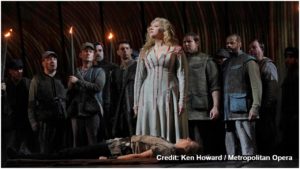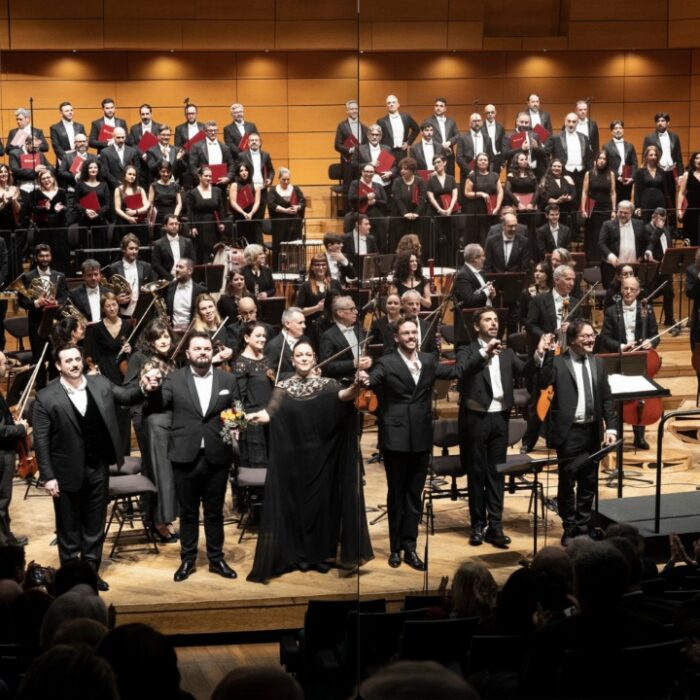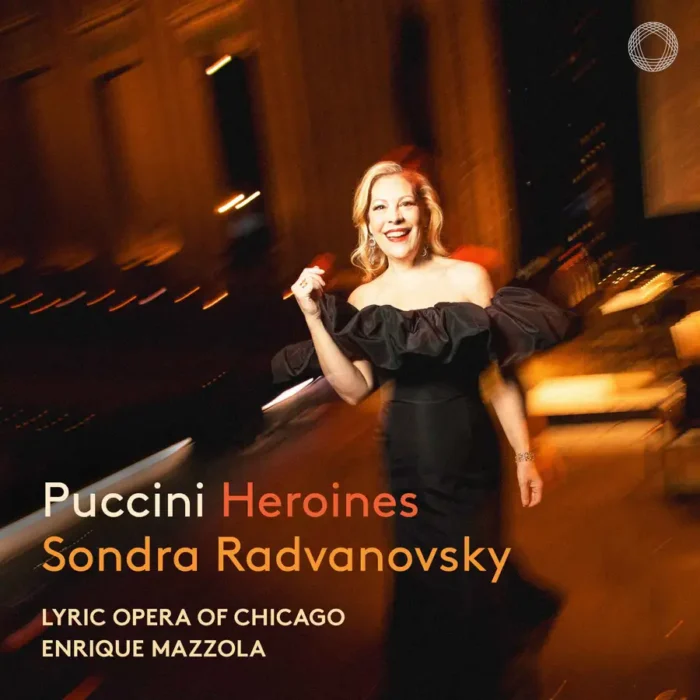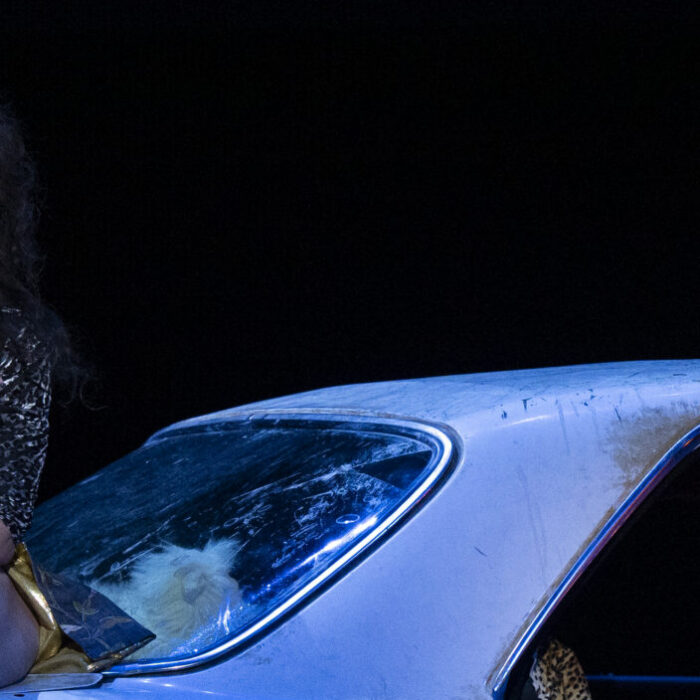
Metropolitan Opera 2018-19 Review: Götterdämmerung
Andreas Schager Triumphs In His Met Debut As Wagner’s Tetralogy Gets Fitting Ending
By David SalazarThe Metropolitan Opera’s first Ring Cycle of the 2018-19 season came to a glorious end with “Götterdämmerung” in a production featuring a tremendous cast. In some ways, this might have been the most satisfying evening of the entire cycle, with a luxurious cast of true singing actors against a production that, at times, had something to say.
A Hero Above All
Andreas Schager made his Met debut in a way only few can dream of. From his very first “Mehr gabst du, Wunderfrau,” his voice beamed into the Met with tremendous potency and brightness. Over the course of the five-hour night, his singing lost none of that warmth or vibrancy. If anything, he got better and better, putting what was undeniably a heroic shift.
His Siegfried, despite exhibiting maturity, was still very much a young man-child coming into his own. From his playful high fives with Gunther and the other men, to uncontrollable around other women, this was a man with a lot to learn.
Siegfried’s betrayal of Brünnhilde in Act one is a highly debated moment. He drinks a potion and forgets her in one fell stroke. In this manner, Wagner is able to give Siegfried a manner of forgiveness in the audience’s eyes – he is but a victim. But here, Schager managed a greater degree of complexity. As soon as Gutrune entered the scene, Schager’s entire body twisted in her direction, betraying his sexual excitement. He still hadn’t drunk the potion, so he had no excuse for his sudden attraction to her. As he took up the drinking horn, his delivery of “Vergäss’ich alles, was du mir” was gentle in its approach, the voice subtley crescendoing to the final D flat as he pronounced “Brünnhilde, bring ich dir.” While expressing his love outwardly, there was a tinge of melancholy and loss in his singing, as if he knew exactly what he was doing. For the rest of the performance from here on, mentions of Brünnhilde or their past were met with a headache for Siegfried, as if he were in constant inner battle with his betrayal. They became less frequent overall, expressing that Siegfried was overcoming his sense of guilt, but never truly left him. This added to the complexity of the hero as a human corrupted by the social framework he was engaging with.
His confrontation with Brünnhilde was likely the dramatic highlight of the evening, the two singers seemingly pushing one another to greater vocal heights as the scene developed. Schager never let up, his sound growing and growing with each retort, adding to the tension. It is also worth mentioning that Schager’s vocal virtuosity was on full display at the end of the first Act when, disguised as Gunther, he steals the ring from Brünnhilde on the rock. The tenor gave his sound tremendous heft, becoming almost unrecognizable.
He was perhaps at his most rich vocally in the third Act, first in his interactions with the Rhinemaidens and then in recounting his life. The high C with which he greets the other hunters was a true standout moment. Where other tenors scoop up and down from the high note quickly, Schager added a fermata, holding the note for a few seconds to truly visceral effect. The fact that his singing showed no distress as he recounted each of the bird’s moments was all the more impactful, showcasing his vocal prowess and Siegfried’s own heroic nature in a rather direct way.
But nothing could top his final moments as he finally remembers Brünnhilde to some of the most glorious music of the tetralogy. “Brünnhilde, heilig Braut” was sung with expansive line, Schager’s bright sound given a darker hue that immediately expressed a sense of maturity and enlightenment for the character. While some artists cut off the ends of phrases to express Siegfried’s loss of strength, Schager went in the opposite direction, his voice growing to the end of each phrase. His death was transformation and expansion; Siegfried had seemingly come to appreciate what Brünnhilde had sought to teach him. In this context, the death scene had a greater tragic dimension. It wasn’t until he was no more that he could be more. In this manner, however, one can also understand Brünnhilde’s own wisdom to be with Siegfried in death.
The Heroine Of The Tetralogy
It is in “Götterdämmerung” where the audience comes to realize that Brünnhilde is the true hero that Wotan had been searching for. Reborn as a woman and forced to live without his guidance, she is the one who ultimately does what no one else could – return the Ring and bring about the destruction of the Gods. And as Brünnhilde, Christine Goerke was the embodiment of power throughout.
From her first appearance to the end of the opera, Goerke’s Brünnhilde was a dominant presence. Brünnhilde finds herself with the greatest challenges in the entire opera, having to encounter her sister, Siegfried (twice), and then the other characters until she ultimately burns it all down. Not once, did this Brünnhilde betray a sense of insecurity. She undeniably hurt in her confrontations with Siegfried, but you never felt that she was just going to give in and let herself be dominated. This sense of strength and power was at its greatest prominence during the confrontation with Siegfried in Act two (get ready for a lot of mentions of this scene throughout the review). Those “Betrug!” and “Verrat” repetitions on an E flat and G flat thundered through the hall with great power, and you could sense that Goerke’s voice was unleashed in a way we hadn’t heard it before. “Heil’ge Götter, himmlische Lenker” had tremendous harshness particularly in the upper reaches, expressing Brünnhilde’s anger in a truly visceral manner. It wasn’t pretty or polished in sound at all, particularly the repeated high A’s throughout the passage, but it was truly effective from an emotional standpoint. As the scene developed, Goerke really allowed her singing to take flight, her vibrant middle dominating the scene. As with Schager, she just got better as it went along and the sense of the two engaging in mortal battle climaxed with her grabbing the spear and nearly destroying him with it at one point.
Her sense of composure and presence came to the forefront in the opera’s final scene when she came face to face with Gutrune in declaring herself the true wife of Siegfried. Her look was all she needed, immediately pushing back Edith Haller’s Gutrune without much more effort.
The immolation scene is Brünnhilde’s big moment in the cycle. Not only does she bring it all to an end, but she gets to do it with some of the most glorious lines in all of opera. It is the paramount test for any interpreter of the role. Goerke did well in some moments. “Wie Sonne lauter strault mir sein Licht” was undeniably the most poignant moment of the entire scene, with Goerke’s legato lines stunningly beautiful, her sound rich and flowing seamlessly.
But there were others, mainly any punctuated by a high note (of which there are a ton in this passage), that unfortunately didn’t quite register. As the scene draws to its close, Brünnhilde is faced with one high note after another (namely anything above high A flat), and Goerke’s sound increasingly lost focus, volume and pitch accuracy. Of course, she is at the end of a long night and one can understand just how challenging it is to sing this passage, but her high range, in general, seemed troubled over the course of the opera. While the middle of her sound all the way down to the bottom is focused, the top loses that brightness and stability, the pitch often going flat and the sound muddled. In the Act two showdown, this quality doesn’t detract from the fury but adds to the emotional messiness of the moment. But in the moment of heroism, it undercut her proclamations, each high note similarly hit or miss. Fortunately, Goerke’s stage presence made her a force regardless and mitigated these vocal effects somewhat.
If not for the Immolation Scene, this was an incredible night overall from the soprano.
Scheming Siblings
Hagen is one of the most horrid of all villains in opera. He is a brilliant mastermind, who is also the ultimate outsider in the world of men. Power is within his grasp and yet so far away. And Eric Owens proved the perfect interpreter for the character.
The American bass’s dark and edgy sound gave Hagen a sense of crudeness. But this was juxtaposed by Owens’ elegant legato line, which gave the character nobility and avoided a caricature that some often slide into. Just because Hagen is an ugly character at heart, doesn’t mean he has to sound like one.
What was particularly potent about Owens’ interpretation is how he gradually pulled back the layers on Hagen and exposed his damaged heart. When we first encounter him with his siblings, he’s but another human being with a wise mind. His singing in praise of Brünnhilde and Siegfried exhibited elegance and precision. Early interactions with Siegfried were similarly direct and proper, with little semblance of sarcasm in the singing. When Hagen finally exposes his darkness in, Owens started to really allow the ruggedness in his sound to take over. But even here, there remained a sense of composure, which emphasized Hagen’s sense of control.
His encounter with his father at the start of the second Act really emphasized the fact that Hagen was in a weaker state, Owens’ voice delicate and soft, almost piano. He looked weaker in the scene and the lack of pushback on his part, only emphasized how Hagen might actually be little more than a puppet in all this. It humanized him quite prominently.
In his scene with the other men, we saw Hagen the leader as Owens’ voice rang out with amplitude and vibrancy. And this sense of control and might continued during the big confrontation that ensues between Brünnhilde and Siegfried. While the others battle back and forth, Hagen’s interjections retained their vocal wholeness, never betraying a sense of the evil that lay behind. He came off as a fair judge.
But then his evil really started to come to the forefront during his interactions with Brünnhilde in the trio at the end of the Act, but especially in the final scene with Siegfried in Act three. “So singe, Held,” a seemingly innocuous line of encouragement in the middle of Siegfried’s narrative was one of the most startlingly visceral moments of the scene. Owens’ delivery of the “held” had a harsh and overly emphatic quality that came off as sardonic; suddenly Hagen was playing nasty. And he would continue to do so all the way until he viciously murdered the hero.
As he returned to his home, his encounter with Gutrune was underlined with even harsher sarcasm as he told his sister to welcome her hero home. And he ripped off the mask during his encounter with Gunther, Owens’ giving some savagery to his rendition of “Des Alben Erbe fordert so sein Sohn!” There was a cathartic feeling to finally seeing Hagen’s monstrosity fully exposed. As far as character development goes, this was a masterfully constructed slow-burn.
The Gibischung siblings were portrayed by Edith Haller and Evgeny Nikitin. Nikitin initiated his first scene with a tremendous sense of power and might, sitting comfortably at a dining table and calling his servants to and fro. His voice had ample weight and presence with ringing high notes that would be a trademark of his performance throughout. But as the narrative unraveled, his Gunther became increasingly marginalized as a hero and he looked completely at a loss during the scene between Brünnhilde and Siegfried in Act two. A glance towards him during this battle of wills saw a man trying to hide as best as he could. In visual imagery mimicking his first appearance in Act one, he sat in a chair during the final trio of the act, but his body language was that of a conflicted man. He wasn’t so much a pathetic, powerless man, as much as a human being at conflict with what he’s done and what he is being asked to do. While Hagen and Brünnhilde walked about the stage, he was immobile and his voice seemed to lose some of its power, the sound softer and more muted. This continued throughout Act three, but this time, he looked scared and reticent to interact with Siegfried; one immediately saw the sense of guilt coming to the forefront and his rejections of Siegfried had not so much to do with his own personal indignity as a sense of loss for what he has done and will allow done to Siegfried. So when he summarily questioned Hagen on what he had done, it came from a place of guilt and pain, not of incredulity. His attempt to fight Hagen at the end of the Act saw his voice retain some of its initial power, but by this point, Gunther looked like a man running to his death instead of the potent leader one imagined at first.
Haller portrayed Gutrune as a delicate and shy woman, her singing svelte in the middle range, though a bit harsh and pushed in its upper reaches; this was particularly evident on a high A on “Siegfried” that she intoned at the top of Act two and an ensuing high A on “rufe di Mannen.” That aside, she was effective in portraying her an insecure woman fighting to keep Siegfried by her side, though undeniably frightened by the mere presence of Brünnhilde in her midst. This made for a strong confrontation between the two in the opera’s final scene, though their eventual understanding was a nice touch and added to restoring Gutrune to a place of integrity.
The Villain Dominates & Trios Of Destiny
Tomasz Konieczny has been one of the great revelations of this cycle. He had a standout turn in “Das Rheingold” as Alberich, followed by a similarly involving scene in “Siegfried.” His role in the final installment is little more than a cameo, but he made the most of it, particularly in his repeated phrasing of “Schläfst du, Hagen, mein Sohn?” He gave an upwards inflection to the end of “Sohn,” which was effective in how off-putting and unexpected the phrasing proved. It added to the overall eeriness of the scene while intuiting Alberich’s evil nature. The scene was marked by a general sense of control by Konieczny. We’ve seen him rage and throw caution to the winds with his booming voice. But here, Alberich, despite being rejected by his sleep son, held those intense emotions in check, making him all the more imposing as an imminent threat. This scene not only made Alberich more formidable as a distant threat but somehow made Hagen vulnerable in the process. Konieczny was one of the big standouts of this entire Ring Cycle and even in this opera, where he has the least stage time, he managed to elevate his performance and that of his scene partner.
As Waltraute, Michaela Schuster was potent onstage, challenging Goerke at every turn, making the end of their encounter one of the tensest moments of the performance. Even if vocally she was far slenderer than the American soprano, Schuster’s Waltraute was her sister’s match and her agitated physicality only added to the sense of impending doom.
The opera features two distinct trios in the Norns and the Rhinemaidens. Ronnita Miller, Elizabeth Bishop, and Wendy Bryn Harmer delivered rather introspective approaches as the former group, with Harmer a tremendous standout in her passages, her voice booming into the theater with general ease. She’s had tremendous success throughout this cycle as Freia and a Valkyrie and it feels like one of the major sopranos roles in this tetralogy is inevitable.
In the roles of the three Rhinemaidens, Amanda Woodbury, Samantha Hankey, and Tamara Mumford were in sync with one another throughout as they toyed and then warned Siegfried of his impending doom. There was general grace in their singing and their carefree manner with the young hero drew grew laughter and general enjoyment from the audience.
Master Of It All
The orchestra, under the baton of Philippe Jordan, continued to deliver some truly memorable music-making. There were a few issues at intervals with the horn section at the start of the third Act, but it was but a minor blip in an otherwise unforgettable rendition. As always, Jordan’s music-making is far more nuanced in his approach, elegance, and form always at the forefront. This allows him more musical bandwidth when he wants to let the orchestra explode at tonal extremes, such as Siegfried’s funeral music, which might have been the single most incredible orchestral moment of the entire Met season. After hinting at the orchestra’s full brutality in the second Act, Jordan unleashed the instrumental forces during the accentuated chords that frame the famed passage. The tempo itself was expansive and slower, but it allowed for the passage to build and for all the individual leitmotivs to paint a panoramic portrait of Siegfried’s life. This was a true celebration of a hero’s life. The same went for the very end of the first Act, where after keeping tempi stable throughout, Jordan’s super-fast tempo for the coda suddenly allowed the orchestra to race to the finish and leave the audience in an adrenaline rush. You wanted Act two to start right away.
The Act two confrontation between Brünnhilde and Siegfried is arguably the most intense moment of the entire tetralogy, as far as heated arguments going, with Jordan really pumping up the orchestra’s sense of drive and momentum the moment that Brünnhilde took up Hagen’s fear to wear her own oath. The pulsating strings that underscore her lines breathed tremendous energy into the moment.
And the opera’s grand finale had a rhapsodic feel. The entire desecration of the world, replete with motifs flying all over the place, was an explosion of sound, pushing on and on with increasing rapidity. But the famed redemption motif was allowed ample breadth to express itself in the closing bars, giving a sense of glorious longing as this incredible musical journey drew to a close.
The Best & The Worst
In terms of the Robert LePage, this last installment includes both the best and worst features of what the famed machine could do. From a visual standpoint, it is the one to really create an array of beautiful imagery that allows the viewer to constantly be reminded about how the human world is at odds with nature. All of the Gibischung scenes take place, as displayed by the machine, within wooden walls. They serve as a reminder of how nature is used to support man’s world in truncated manners. But they also create a constant reminder of Valhalla, Wotan’s palace which has been boarded up with the branches of the World Ash Tree. Like Wotan’s world, which was corrupted by laws and trickery, among other things, the world of man seems positioned for a similar fate, which of course, it ultimately endures when Brünnhilde burns the entire thing down. This visual symbolism is undeniably the single best and most insightful dramatic comment from LePage over the course of the entire opera.
There is also an inspired decision to turn the entire Rhine river red with Siegfried’s blood, after the murder; this serves as a major statement by LePage to further the notion that humankind is damaging nature.
But this visual symbolism isn’t the only thing going for the machine in “Götterdämmerung.” At one point, we see the Rhine river materialize during Siegfried’s big journey. However, a few planks in the middle won’t quite mesh with the others around it. As the behemoth of planks starts to turn over, we realize that we have been given a perspective from below and that those central planks were Siegfried’s boat.
Of course, the production still features some bland costuming throughout and strange blocking (why does Hagen just stand around while Brünnhilde takes the ring; why does he do nothing when she burns it all down? Isn’t he after the ring so that he can seize control of the situation?). But the biggest issues are the new additions- statues of the Gods and Grane. The God statues look rather unfinished in design. In previous renditions of this production, the audience laughed rather pointedly when the heads rolled off at the opera’s climax. In this iteration, the decision was made to have them fall over; the audience still laughed.
Then there’s Grane, Brünnhilde and Siegfried’s noble stead. Sometimes certain things are left to the imagination and not everything needs to be literalized. We never saw him at the end of “Die Walküre.” But the massive toy horse that appears at two points in this opera (Siegfried’s Rhine Journey and the Immolation Scene) and adds next to nothing. Maybe you can get away with it during the joyous Rhine journey, but he looks completely out of place during the intense and transcendent Immolation Scene. The horse drew a few chuckles during this climactic moment.
On the whole, it was truly a spectacular afternoon at the Metropolitan Opera with the merits of Wagner’s glorious score on full display.


